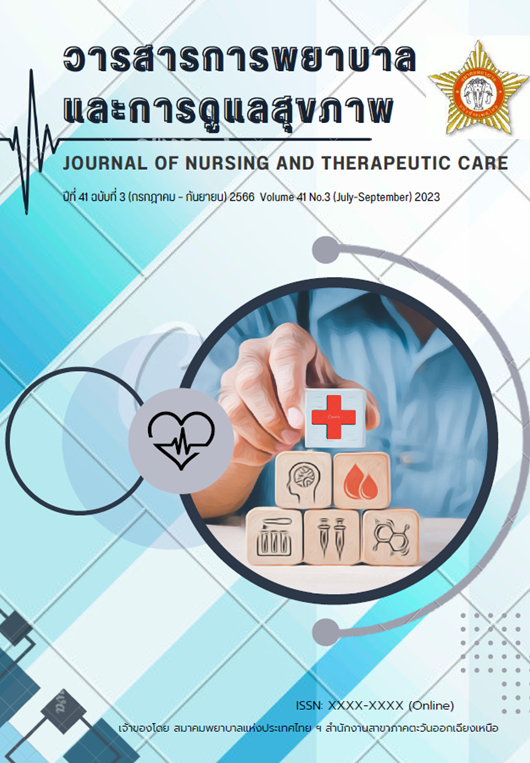การจัดการตนเองของผู้ป่วยโรคไม่ติดต่อเรื้อรัง : โมเดลการดูแลในช่วงการระบาดของโควิด-19
คำสำคัญ:
ผู้ป่วยโรคไม่ติดต่อเรื้อรัง, การจัดการตนเอง, โมเดลการดูแล, ช่วงการระบาดของโควิด-19บทคัดย่อ
โรคไม่ติดต่อเรื้อรังมีจำนวนเพิ่มขึ้น ลักษณะของโรคจะทำให้เกิดพยาธิสภาพที่ถาวรและก้าวหน้าแบบเรื้อรัง โดยโรคอาจกำเริบและทรุดลงได้ตลอดระยะเวลาเจ็บป่วย โดยเฉพาะผู้ป่วยที่ควบคุมโรคได้ไม่ดีหรือมีพฤติกรรมเสี่ยงสูง ทั้งนี้ในช่วงการระบาดของโควิด-19 มีผลกระทบต่อการดำรงชีวิตของทุกคน ทำให้ผู้ป่วยมีข้อจำกัดในการปฏิบัติพฤติกรรมสุขภาพ และความจำกัด ด้านการเข้ารับบริการสุขภาพตามปกติที่โรงพยาบาล ผู้ป่วยจึงจำเป็นต้องพัฒนาการจัดการตนเองโดยการติดตามตนเอง การเฝ้าระวังโรค และการควบคุมโรคเพื่อให้มีคุณภาพชีวิตที่ดี อย่างไรก็ตามข้อจำกัดในช่วงการระบาดของโควิด-19 ทำให้ผู้ป่วยอาจหาทางจัดการตนเองแบบลองผิดลองถูก หรือการแสวงหาแหล่งสนับสนุนและช่วยเหลือ บทความวิชาการนี้มีวัตถุประสงค์เพื่อสะท้อนให้เห็นความสำคัญของแนวคิดการจัดการตนเองในช่วงการระบาดของโควิด-19 สำหรับผู้ป่วยโรคไม่ติดต่อเรื้อรังเนื่องจากมีความจำเป็นและ เป็นความท้าทายที่ควรตระหนัก เพื่อให้ผู้ป่วยโรคไม่ติดต่อเรื้อรังเป็นผู้ดูแลสุขภาพของตนเองได้อย่างมีประสิทธิภาพและยั่งยืน
Downloads
เอกสารอ้างอิง
World Health Organization. Noncommunicable disease progress monitor 2020. Switzerland: World Health Organization; 2020.
Luciani S, Caixeta R, Chavez C, Dolores Ondarsuhu D, Hennis A. What is the NCD service capacity and disruptions due to COVID-19? Results from the WHO non-communicable disease country capacity survey in the Americas region. BMJ. 2022;13:e007085
Division of Non - Communicable Diseases, Ministry of Public Health. Annual report NCDs 2022. Bangkok: Augsorn Graphic Design; 2022.P.10-12. (in Thai)
Division of Non - Communicable Diseases, Ministry of Public Health. Take lessons: National strategic plan for prevention and NCDs control-5 years (2017-2021). Bangkok: Augsorn Graphic Design; 2022.P.10-15. (in Thai)
World Health Organization. Noncommunicable diseases now ‘top killers globally’–UN health agency report [Internet]. 2022. [cited 2022 Sept 16]. Available from: https://news.un.org/en/story/2022/09/1127211.
Division of Non - Communicable Diseases, Ministry of Public Health. Report: situation of NCDs: diabetes, hypertension, and related risk factors 2019. Bangkok: Augsorn Graphic Design; 2022.P.10-24. (in Thai)
World Health Organization. Noncommunicable disease progress monitor. Switzerland: WHO; 2020.
World Health Organization. Noncommunicable disease [Internet]. 2022 [cited 2022 Sept 16]. Available from: https://www.who.int/news.-room/fact-sheets/detail/noncommunicable-diseases.
Yadav UN, Mistry SK, Ghimire S, Schneider CH, Rawal LB, Acharya SP, et al. Recognizing the roles of primary health care in addressing non-communicable diseases in low- and middle-income countries: Lesson from COVID-19, implications for the future. J Glob Health. 2021;11:03120
Wu Y, Wen J, Wang X, Wang Q, Wang W, Wang X, et al. Associations between e-health literacy and chronic disease self-management in older Chinese patients with chronic non-communicable diseases: a mediation analysis. BMC Public Health. 2020;22:2226
Xiong S, Lu H, Peoples N, Duman EK, Najarro A, Ni Z, et al. Digital health interventions for non- communicable disease management in primary health care in low-and middle-income countries. NPJ Digit Med. 2023;6:1-12.
Bullen C, McCormack J, Calder A, Parag V, Subramaniam K, Majumdar A, et al. The impact of COVID-19 on the care of people living with noncommunicable diseases in low- and middle-income countries: an online survey of physicians and pharmacists in nine countries. Prim Health Care Res Dev. 2021;22:e30.
Bandura A. Social foundations of thought and action: A social cognitive theory. New York: Prentice-Hall; 1986.
Kanfer FH, Gaelick-Buys L. Self-management methods. In: Kanfer FH, Goldstein AP, editors. Helping people change: A textbook of methods. New York: Pergamon Press; 1991.P.305-60.
Lorig K, Holman H. Self-management education: history, definition, outcome, and mechanisms. Ann Behav Med. 2003;26(1):1-7.
Sansupa K, Kuntawong N. Self-management: The skill of sustainable self-development. Journal of Liberal Arts (Wang Nang Leng) RMUTP. 2021;1(1):26-37. (in Thai).
Creer LT. Self-management of chronic illness. In Boekaerts M, Printrich PR, Zeidner M, editors. Handbook of self-regulation. San Diego, CA: Academic Press; 1988.
Wattana C. Self-management support strategies for promoting disease control. Journal of Phrapokklao Nursing College. 2015;25(Suppl.1):117-27. (in Thai).
Achieng MS, Ogundaini OO. Digital health and self-management of chronic disease in sub-Saharan Africa: a scoping review. S Afr J Inf Manag. 2020;24(1):1-8.
Hossain MM, Tasnim S, Sharma R, Sultana A, Shaik AF, Faizah F, et al. Digital interventions for people living with non-communicable diseases in India: A systematic review of intervention studies and recommendations for future research and development. Digit Health. 2019;5:1-18.
Tighe SA, Ball K, Kensing F, Kayser L, Rawstorn JC, Maddison R. Toward a digital platform for the self-management of non-communicable diseases: systematic review of Platform-Like Interventions. J of Med Internet Res. 2020;22(10):1-10.
ดาวน์โหลด
เผยแพร่แล้ว
รูปแบบการอ้างอิง
ฉบับ
ประเภทบทความ
สัญญาอนุญาต
ลิขสิทธิ์ (c) 2023 วารสารการพยาบาลและการดูแลสุขภาพ

อนุญาตภายใต้เงื่อนไข Creative Commons Attribution-NonCommercial-NoDerivatives 4.0 International License.



